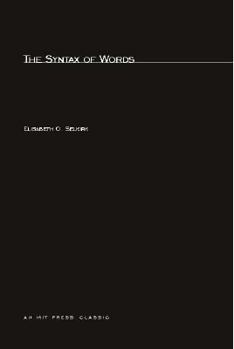The Syntax of Words
An examination of complex words--compounds and those involving derivational and inflectional affixation--from a syntactic standpoint that encompasses both the structure of words and the system of rules for generating that structure. This monograph examines complex words--compounds and those involving derivational and inflectional affixation--from a syntactic standpoint that encompasses both the structure of words and the system of rules for generating that structure.The author contends that the syntax of words and the more familiar syntax involving relations among words must be defined by two discrete sets of principles in the grammar, but nevertheless that word structure has the same general formal properties as the larger syntactic structure and is generated by the same sort of rule system. This investigation of word structure and rule systems is based for the most part on the word syntax of English and related languages. One of its major conclusions is that English word structure can be "properly characterized solely in terms of a context-free grammar." Selkirk points out that the Semitic languages, for example, must be characterized in terms of a more elaborate schema. The first chapter presents a general theory of word structure, and discusses a context-free grammar for words, X theory in word structure, and word structure rules. The second chapter is concerned with compounding, and probes the structure and "headedness" of compounds, verbal compounds, and the category type of English compounds. The third and final chapter, on affixation, investigates the nature of affixes, inflectional affixation, and English derivational morphology. This book is the seventh in the Linguistic Inquiry Monograph series.
Format:Paperback
Language:English
ISBN:0262690799
ISBN13:9780262690799
Release Date:October 1982
Publisher:Mit Press
Length:136 Pages
Weight:0.55 lbs.
Dimensions:0.4" x 5.7" x 8.7"
Age Range:18 years and up
Grade Range:Postsecondary and higher
Related Subjects
Language ArtsCustomer Reviews
0 rating





